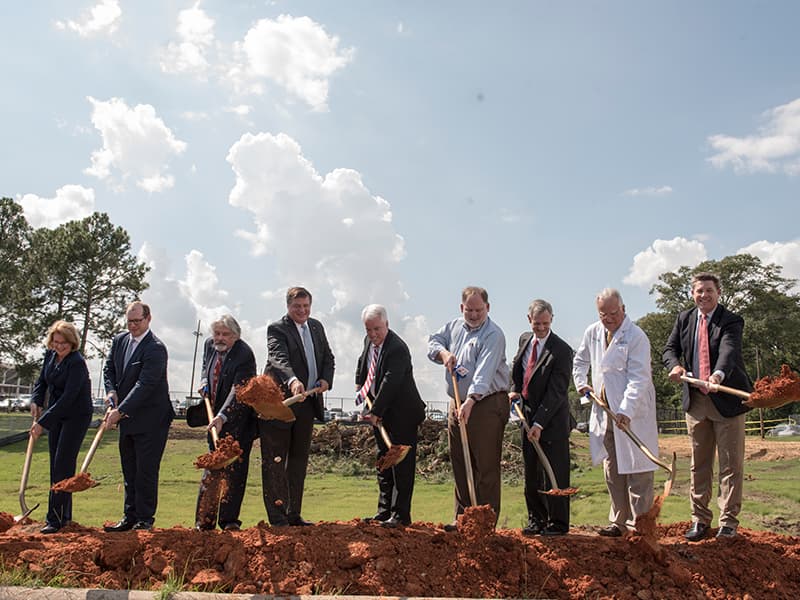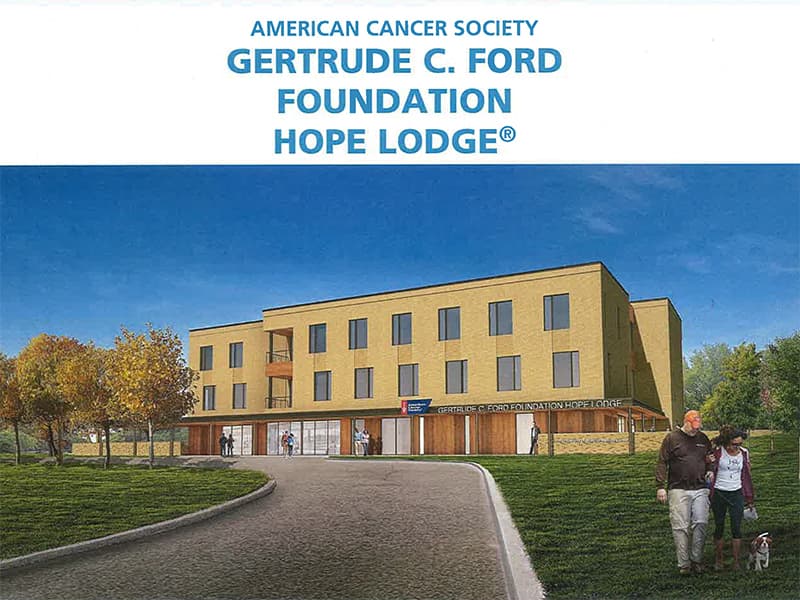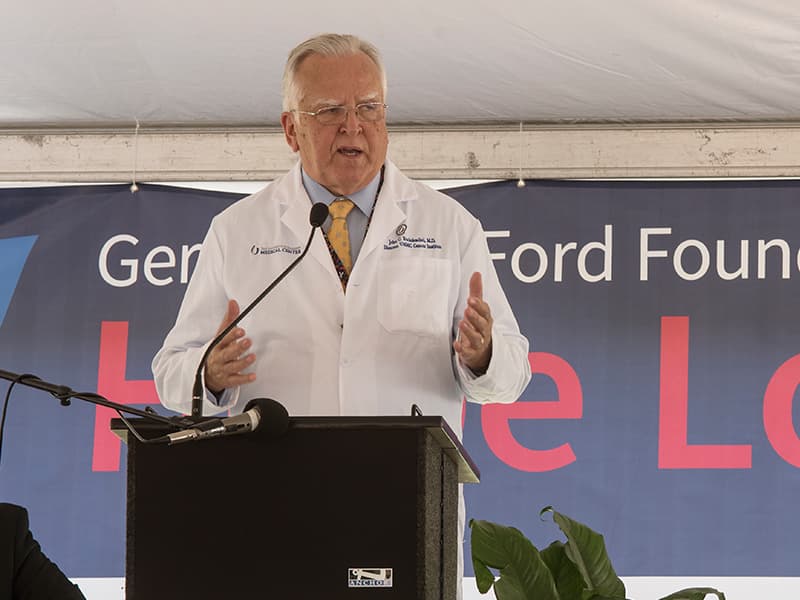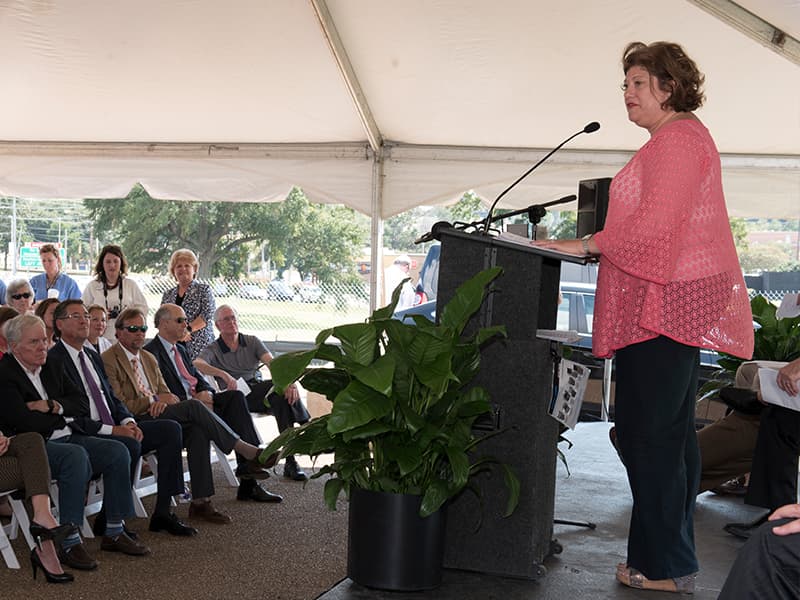Hope Lodge to help patients focus less on details, more on beating cancer

Officials from area hospitals and the American Cancer Society this week celebrated the next step in a process to provide free lodging for cancer patients receiving treatment in the Jackson area.
Short only $600 thousand of the $10.9 million needed for a Hope Lodge, they officially broke ground for the building on property adjacent to and donated by the University of Mississippi Medical Center.
It’s called a hope lodge for a reason, said John Lewis, a board member of the Gertrude C. Ford Foundation, for whom the facility is named.
“This is a waypoint in a patient’s journey where they come to rest, where they come for help,” Lewis said.

The Ford Foundation bolstered the ACS fundraising with a $3 million gift in December 2014. Donations have ranged from a few dollars to the Ford Foundation gift, the largest received.
It’s more than he envisioned, said Dr. Ralph Vance, a hematologist/oncologist who retired from the UMMC Cancer Institute in 2011. He discussed the need in 2004 with the late Dr. Wally Conerly, who had recently retired as vice chancellor for health affairs at UMMC.
“It had become apparent to me that Mississippi and Arkansas were the only states in the mid-South that did not have a Hope Lodge built or plans to be built,” said Vance, a former ACS national president. He’s been working to build it ever since.
The official ACS campaign began in 2011, backed by years of planning, said Robert Morris, ACS vice president for community development.
For Dr. John Ruckdeschel, UMMC Cancer Institute director, the need for a Hope Lodge has been evident since his sister was treated for breast cancer when he was leading the Moffitt Cancer Center in Tampa, Florida. “We had a large, boisterous family descend on our house for weeks on end. Our lives and theirs were totally disrupted by the process. Right then, I became convinced of the need for a Hope Lodge.”
Working with other Tampa-area hospitals, they got one.

The need in Jackson is evident too. While the ACS estimates about 1,500 people travel 40 or more miles for cancer treatment in Mississippi, Ruckdeschel knows that more than half the patients treated at UMMC travel 50 or more miles.
With those needs in mind, Ruckdeschel and his wife, Angie, made a $10,000 donation toward a guest room. Amanda Crawford, executive director of the ACS in Mississippi, said each room will include a plaque thanking donors and they’re seeking more room sponsors.
Ruckdeschel said he treasures notes patients lodging in Tampa have sent him.
Mike Neal, ACS executive vice president, said Hope Lodge is a necessity for patients who can’t get cancer care closer to their homes. Some get no care at all. “They can’t get care because they can’t afford the expenses of that out of town stay,” he said.
Jerry Host, president and CEO of Trustmark Bank, described the obstacles the campaign faced: “We started in the middle of the great recession and had the unexpected discovery of burial grounds on the original site.”
UMMC originally donated property on the campus east side but had to change sites when graves, likely from the state’s first mental institution, were discovered there.
That determination will help some of the 17,290 Mississippians who the ACS predicts will be diagnosed with cancer in Mississippi this year, Morris said.
Once complete, the Lodge and the ACS Guestroom Program are expected to provide more than 12,000 nights of free accommodations, saving cancer patients $1.5 million in expenses annually. Since the ACS also provides transportation to and from treatment, patients will save an estimated $50,000 annually on those costs.

The solace goes beyond easing a financial burden, said Ramona Walters Anderson of Taylorsville, a cancer survivor who used the Hope Lodge at the University of Alabama at Birmingham in 2006. The community kitchen and dining areas encourage patients to become involved in the community. “You eat with other patients and they become your family,” she said.
She encouraged the crowd to get involved. “Someone you love or yourself maybe, will have to use this facility,” she said.
The Ford Hope Lodge should be complete in 2019, joining 32 current and six other planned sites across the nation.
The Ford Hope Lodge will have:
- 32 rooms with private baths for a cancer patient and one caregiver.
- Two kitchens, two dining room, a living room, library, activity room and laundry center.
- Free transportation to and from treatment at Jackson-area hospitals.
To find out more about the Ford Hope Lodge, click here.


